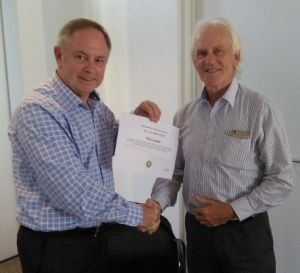Hi everyone,
The year is racing along. Someone said to me the other day that it won’t be and long before we hear Christmas carols in the stores again!!
The Board met recently to sign off on the revised Code prior to submission to the Minister for Infrastructure for approval. A 2019/20 work programme was adopted, which includes focusing on Code promotion and compliance. Preparations are well underway for the RIMS conference in Dunedin in March, where we will update participants on current issues and the year ahead.
Tracy Bell (Timaru District Council) representing Local Government NZ, was welcomed to the Board. Tracy joins Ria Apiata (KiwiRail) representing the National Rail Corridor and Brendan Drysdale (Wellington Electricity) representing the Electricity Sector who both came onto the Board following the November AGM as new sector representatives.

At this meeting we also farewelled Phil Consedine representing LGNZ, who has worked tirelessly on industry’s behalf to promote understanding and compliance with the Code. Many thanks Phil for all your work and we wish you well for the future.
As always, please get in touch with us if you have any comments on the newsletter of if you need further information.
Warm regards, Paul Swain
Independent Chair,
NZUAG
In this edition:
- Code review update
- Code compliance reporting update
- The 2019/20 Work Programme
- RIMS conference: 21/22 March, Dunedin.
- Board member profiles.
Code review update:
The NZUAG Board has signed off the revised Code that will shortly be submitted to the Minister for Infrastructure for approval. The second formal Code review was our prime project tackled in 2018. We undertook three rounds of submissions from industry and the public. A total of 32 submissions were received with 273 submission points being carefully considered by the Code review committee. Overall we have translated 41% of the submission points into changes to the Code that have been legally reviewed. We will be recommending the revised Code to the Minister for approval shortly.
As we found with the inaugural Code review in 2014, the underlining theme of comments made was that the Code was fit for purpose and didn’t need radical change. The submissions mainly sought clarifications or tweaks to reflect improvements through working experience. We found this quite gratifying.
NZUAG wishes to acknowledge the huge contribution made by those who made submissions. It is through these efforts that the Code gets improved for everyone’s benefit.
My thanks to Ross Malcolm, Ian Cox, Phil Consedine and Rachel Nottingham for the hours they spent on the review on behalf of industry. Thanks also to Colin Lewis for the administrative support throughout the review process.
We are hoping the revised Code will be approved around the middle of the year. The documents relating to the Code review, including the submissions, the committee’s response, a summary of the changes and the approved track change version of the Code will be available on the NZUAG website at that time. I’ll keep you posted on developments.
Code Performance
The Board is required to collect data on Code performance on an annual basis. The 2017/18 returns are in, and once again the response rate has been average, given the response to requests for information is compulsory under the Code. We’ve had a 56% response rate from Corridor Managers, a 77% return from the electricity sector, 100% from gas, 40% from telecommunications and we’re still waiting for the three waters return.
In the past data was analysed on a “per kilometre network basis” for both transport corridor and utility networks. This time we have looked at the returns on a “population coverage” basis for Corridor Managers, which we think is a more meaningful way to judge the effectiveness of the Code. We are now chasing up seven larger Corridor Managers and the water sector to get us close to 90% population coverage, which will then allow us to report to industry and the Minister on how the Code is performing.
The Code performance work is a big focus of the Board, and it has had mixed results over the years despite the hard work of our Code compliance committee. As part of the 2019/20 work programme, the Board will set up a working group of interested members to see if we can make better progress on this issue. Details of this approach appear in the work programme section below.
2019/20 Work Programme:
The Board recently approved the work programme for the coming financial year. The programme includes:
- Finalising the Code review: The Board has signed off the revised Code (see above) and will be submitting it to the Minister for approval shortly. We expect the new version of the Code to be in place by mid-year.
- Code education and promotion: The Board recognises that Code education and promotion is critical to improving Code compliance. As part of the recent Code review, the Board held seminars in 5 centres throughout NZ, and ran 3 webinars. The objective was to give people a chance to discuss the Code and to propose changes. The Board will run webinars later in the year on the updated Code, and hold seminars in Code review years. Details of this year’s webinars will be outlined in subsequent newsletters.
- Code effectiveness and compliance: Code compliance is one of the key issues that people have raised during the seminar and webinar series. As outlined above, the Board has spent considerable time and effort on this issue with mixed results. We are therefore calling for input from members to help us progress this issue. The plan is to establish a members working group, facilitated by NZUAG, to focus on improving Code compliance across the sector. We are currently working on the Terms of Reference for the working group and I will report progress in the next NZUAG news. In the meantime, please think about whether you would be prepared to contribute to this working group. Your industry needs you!
- Industry standards and training: There have been calls over the years to improve training for those operating the Code so that industry standards can be enhanced. The CoPTTM model of mandatory training and minimum compliance standards has been suggested as a regime NZUAG might follow. The Board has been reluctant to go down this track due to the resources and compliance costs involved.
Currently, excellent Code training is offered by NZIHT, but this has limited reach because of cost and time away from the job. NZIHT does operate courses for organisations in localities around the country and the Board wants to work with NZIHT to see if that localised training model could be expanded to accommodate Utility Operators and Corridor Managers in a local area. This would help improve the understanding of the provisions in the Code and help improve standards across New Zealand.
- Communications with members and industry: The Board is looking at improving its communications, using tools such as social media, to ensure that everyone is aware of current infrastructure issues and to allow feedback to be more streamlined. We will also be considering improved benefits for NZUAG members to help attract new members in the future. Membership of NZUAG is voluntary, but it is critical to maintaining the industry-agreed Code. If industry itself wasn’t able for some reason to administer the Code, the Government would be required to take on that role. This could result in a much more expensive industry-levy arrangement and would always be a second-best option. We will involve current members in the discussion on ways to increase membership and improve the benefits of membership.
- Reviewing the Utilities Access Act: The Utilities Act is about 10 years old. While that is considered “young” in legislative terms, feedback form Code reviews and seminars suggest that a review of the Act would be useful particularly around the compliance provisions. Any formal review would need to be led by Government, which is not on its radar at the moment. The Board is proposing to conduct an internal review, involving members and industry, to identify any issues with the Act that may need to be addressed and whether they are significant enough to warrant an approach to the Government with a request for a formal review.
Subsequent newsletters and communications will update everyone on the work programme progress.
2019/20 Budget: No increase in member fees.
The Board has approved the 2019/20 budget as presented by the Finance Committee. An allocation of $10,000 has been set aside to progress the work programme if required. Despite that, there will again be no fee increase for the next financial year given the careful management of NZUAG funds over recent years.
RIMS Conference: 20/21 March, Dunedin.
The Road Infrastructure Managers (RIMS) Conference this year is to be held in Dunedin. NZUAG is one of the sponsors of the event, and we host the Corridor Management stream on Day 2. Our opening session will update participants on Code issues, particularly the recent review and access to the rail corridor, as well as the coming year’s work programme. Please consider attending the conference. You should find it really worthwhile. It’s not too late to register: http://rims2019.co.nz/
Board Member Profiles:
Future editions of NZUAG News will include profiles of corridor manager and utility operator representative on the Board. This month we profile new members Brendan Drysdale representing the electricity sector (replacing long serving Ross Malcolm) and Tracy Bell representing LGNZ (replacing Phil Consedine).

Brendan Drysdale: Brendan has been the General Manager Service Delivery, Wellington Electricity, since September 2015. Prior to this, Brendan held the positions of acting General Manager Network and Operations along with Capital Works Manager, having joined Wellington Electricity in 2009. Brendan has over 25 years’ experience in the electricity industry. Outside of work Brendan enjoys playing competitive football and undertaking house renovations.

Tracy Bell: Tracy is the Road Corridor Technician for the Timaru District Council. This role makes her responsible for the management of the road corridor. She is required to engage with Contractors and Utility Operators who require access to the corridor network. Tracy joined the board to look at ways to make the code more easily understood through education and training. Tracy’s other reason for joining is she felt the board needed some female injection, as the board was a little male dominated.
That’s it for now. Please pass this newsletter on to others who may be interested. The next edition will be due out after the May Board meeting.
Regards
Paul
